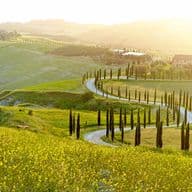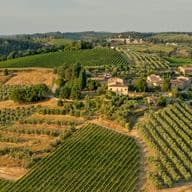- 2 min read
Fun facts about the Palio di Siena
&w=1920&q=75)
The Palio di Siena dates back to the early Middle Ages and has always been a source of curiosity and enthusiasm also outside Siena. The hard and traditional horse race can boil over some emotions. The event is very famous, so tourists come from all over the world to attend the spectacle. Here are some interesting facts that not everybody might know about.
Palio is not only on July 2 and August 16
The race takes place every year on July 2nd and August 16th. In both cases, the event lasts four days, from the assignment of the horses to the contradas, to the morning and evening rehearsals to the Palio. For the Sienese contrada member, the Palio is not only reduced to these days: the Palio is "every day of the year". Those who visit their own contrada only in the days of the Palio are in fact derogatory called "quattrogiornisti" ("the four-dayers"). For the true Sienese, it is important to actively participate in the life of their neighborhood throughout the whole year.
Properties in Siena and province
Engel & Völkers Siena
A horse can win without a rider:
It happened already 24 times that a district won with the horse without jockey; in this case one speaks of the "cavallo scosso", the "shaken horse".The Mossiere never watches the race:
The Mossiere has the task to align the horses before the start and check off when the contradas start the race. Once he has done his job, he leaves the field and never watches the course of the race.Who is the "Nonna" (the grandmother)?
The Palio has a special language and refers to the contrada that hasn't won for the longest time as the "grandma".The Drappellone:
The Drappellone is the only prize the winning district receives. It can also be called "Cencio". Each year its creation is entrusted to local artists (Palio in July) and international artists (Palio in August).

Impartiality:
The Sienese, who hold official positions at city level, cannot join any contrada.A unique view:
The person who enjoys the most breathtaking view of the Palio is the person who rings the bell of the Torre del Mangia until the horses come out. Then he goes to the tower clock to admire the Palio from there.The blessing of the horse:
On the afternoon of the day of the Palio, the pastor of each contrada blesses the horse that will participate in the race with holy water and shouts "Go and return as a winner".Sanctions and disqualification:
Although the race on the outer ring of the Piazza del Campo sometimes appears unorganized and chaotic, one must not believe that there are no rules in this race. On the contrary, the almanacs are full of sanctions imposed on individual jockeys or their contradas to punish misconduct before and after the race.
You may also be interested in
 The Province of Siena
The Province of Siena- 2 min.
 5 most beautiful places to retire in Tuscany
5 most beautiful places to retire in Tuscany Siena’s Piazza del Campo
Siena’s Piazza del Campo- 2 min.
 Val d'Orcia
Val d'Orcia- 2 min.
 The splendid traditional horse race Palio di Siena
The splendid traditional horse race Palio di Siena Valle del Chianti
Valle del Chianti- 2 min.
